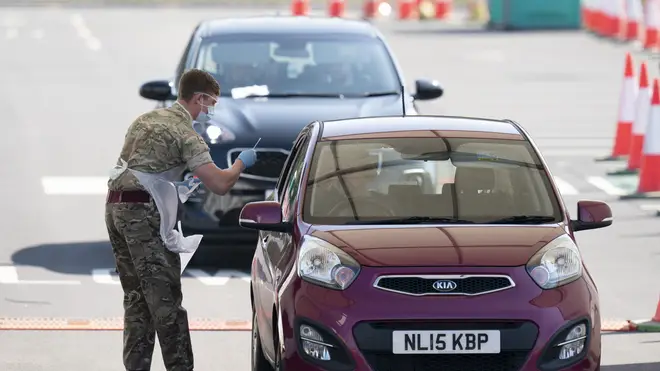
Oli Dugmore 4am - 7am
8 June 2021, 12:42 | Updated: 9 June 2021, 05:41

Rapid response teams and extra testing will be deployed in Greater Manchester and Lancashire as cases of the Delta variant first identified in India rise.
Health Secretary Matt Hancock announced the plan - which includes a request to minimise travel in and out of the affected areas - while addressing MPs in the Commons on Tuesday.
He said the government was "providing a strengthened package of support" for the regions to tackle the rise in the Delta variant.
Similar measures are already in place in Bolton and Blackburn with Darwen.
Read more: PC Wayne Couzens, 48, pleads guilty to kidnap and rape of Sarah Everard
Read more: 'Nightmare': Brits rush back home as Portugal is added to amber list
Addressing MPs, Mr Hancock said: "I can tell the House that today, working with local authorities, we are providing a strengthened package of support based on what is working in Bolton to help Greater Manchester and Lancashire tackle the rise in the Delta variant that we are seeing there."
"This includes rapid response teams, putting in extra testing, military support and supervised in school testing. I want to encourage everyone in Manchester and Lancashire to get the tests on offer.
"We know that this approach can work, we've seen it work in south London and in Bolton in stopping a rise in the number of cases.
"This is the next stage of tackling the pandemic in Manchester and in Lancashire, and of course it's vital that people in these areas - as everywhere else - come forward and get the jab as soon as they're eligible because that is our way out of this pandemic together."
Following the announcement, Boris Johnson's official spokesman said: "We want to provide the package of support that has been effective in Bolton to a wider area ... to tackle the cases of the Delta variant."

James O'Brien hears from an ex-NHS nurse on burnout
The new measures also include isolation support and maximising vaccine uptake, and will be led by local authorities to ensure the right steps are taken at the right time.
It will also involve prioritising wastewater testing samples and enhanced monitoring such as genomic sequencing of samples.
There is also additional guidance on steps people can take, such as minimising travel in and out of the affected areas, to keep their loved ones and their communities safe.
Local authorities also have the power to reintroduce face coverings in communal areas in schools if Directors of Public Health decide it is appropriate.
Similar measures implemented in Bolton have proved to be successful and the area has seen a recent decrease in the number of cases.
Chief Executive of the UK Health Security Agency Dr Jenny Harries said the variant was the "dominant" strain in the UK.
"The most important thing that people in these areas can do is remain cautious, work from home if possible and remember to practise hands-face-space and fresh air," she said.
"Getting the vaccine gives a strong level of protection against this variant and I strongly recommend that everyone gets the jab when the NHS invites you – it will protect you and your loved ones."
Read more: Government delays NHS data scrape by two months after privacy concerns
Read more: PM under renewed pressure to reverse £4bn cut to foreign aid
Early research shows that vaccines provide strong protection against the new variants, with effectiveness against symptomatic disease from the Delta variant similar after two doses compared to the Alpha - formerly known as the Kent - variant, and even higher levels of effectiveness are expected against hospitalisations and death.
The Government and its scientists are closely monitoring the evolving situation and the rates of variants, and will not hesitate to take additional action whenever necessary.
Further details about the measures in each area are being made available through individual local authorities.